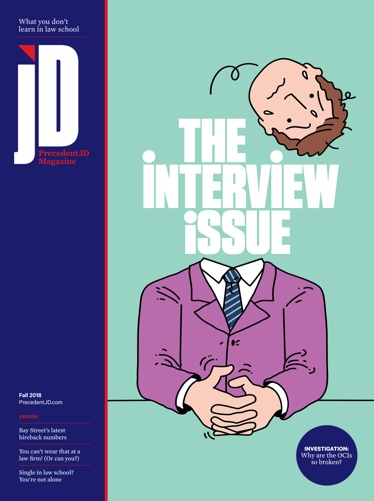
Across Canada, legal culture is hyper-conservative. But current law students are thirsty for change, which forces them to make difficult choices when applying for jobs. “Students often ask me, for instance, if they should include their involvement in the Black Law Students’ Association on their resumés,” says Jordana Laporte, the director of the career development office at the University of Toronto. “They worry that recruiters will stereotype them on the basis of the affiliation.”
Laporte thinks such concerns have merit, but she cautions against self-censorship. “I ask students, ‘Do you really want to work at a place that doesn’t value who you are?’”
This is a hard question to answer. Consider the case of Heather Donkers. As an undergrad at Queen’s University, she was sexually assaulted by a fellow student. Soon after, she went to the police, who laid charges. Over the next two years, she co-operated with the investigation and testified at trial. The end result was a guilty verdict.
Donkers decided to go to law school. “I wanted to make the justice system better for survivors,” says the 3L at Osgoode Hall. During OCIs, she interviewed with several government agencies (from the Crown’s office to Legal Aid Ontario) that operate within the criminal-justice system. To prepare for the interviews, she made a list of every question she expected recruiters to ask. One of them — Why did you go to law school? — gave her pause. “I told some upper-year students that I intended to talk about my sexual assault,” she says. “And some of them thought it was a bad idea.” They worried it could brand her as an agitator who would not accept the status quo.
But Donkers chose to be honest. The choice paid off: she spent this past summer at the Ministry of Community Safety and Correctional Services. “This was a huge internal struggle, but I had to stay true to myself.”

This story is from the 2018 edition of PrecedentJD Magazine
